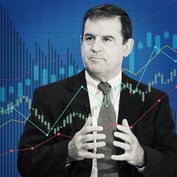What You Need to Know
- Clients might be looking for ways to brace their portfolios for a possible recession.
- Morningstar’s Christine Benz advised against stocks as they haven’t done well in previous recessions.
- High-quality bonds have really delivered during past recessionary periods, she added.
As many economists and market strategists forecast a U.S. recession in the next 12 months, clients may be looking for ways to keep their portfolios on an even keel in rough waters.
Christine Benz, Morningstar’s director of personal finance and retirement planning, recently offered insights on the firm’s website about how investors can add ballast to their portfolios in a recession.
Stocks haven’t done so well in past recessions “because stocks tend to respond to the economic environment, especially if the company is selling discretionary goods or services, [and] people pull back in recessionary times,” she said in a talk with a Morningstar colleague.
Stocks posted losses in five of the last eight recessionary periods, Benz noted, adding, “We probably wouldn’t want to over-rely on the equities to be great performers.”
So what does do well in recessions?
High-Quality Bonds: Recession Stars
“Bonds are the star of the show in recessionary environments, especially high-quality bonds. I wouldn’t put too much faith in lower-quality bonds, which will tend to be very much beholden to what’s going on in the economic environment,” Benz said, according to a transcript.
“When we looked at the category that had the best performance during recessionary periods, high-quality bonds, especially Treasury bonds, really delivered,” she said. In all recessions that Morningstar examined, “bonds came through with flying colors and had positive returns, and they also exhibited a negative correlation with equities.”








 May 25, 2023 at 04:07 PM
May 25, 2023 at 04:07 PM












 Copyright © 2024 ALM Global, LLC. All Rights Reserved.
Copyright © 2024 ALM Global, LLC. All Rights Reserved.